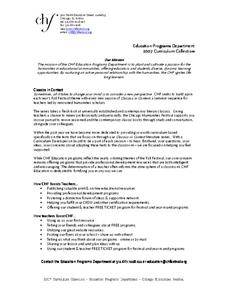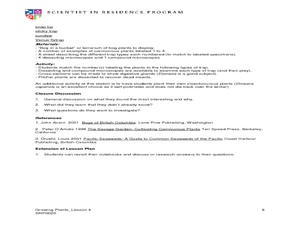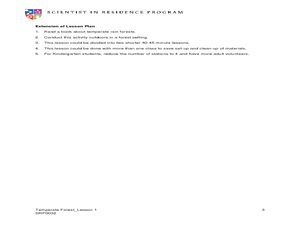Serendip
Structure and Function of Cells, Organs and Organ Systems
Cells of different organs have unique cell functions. Learn how cell functions vary depending on their roles in the body using an inquiry-based activity. Scholars analyze the cell structure to make comparisons to its functions, allowing...
Curated OER
The High Cost of Chemical Dependency
Sixth graders explore, analyze and study the effect and impact that humans have on the environment based on their choices as individuals, businesses and governments. They assess the balance between human activities and aquatic pollution.
Curated OER
Beowulf
High schoolers complete literature analysis activities for Beowulf. They read lines from the poem and complete character analysis activities. In addition, they write and share a boast modeled on the text and then create heroes and...
Curated OER
History's Thermometers
Ancient coral beds give scientists clues to past ocean temperatures in much the same way that tree rings indicate historical weather conditions. High school scientists examine coral oxygen isotope ratios and plot the data as a function...
Curated OER
Survival of the Fittest
Learners explore plant needs and growth. In this plant science lesson, students use a cereal box to complete a plant growth graph activity.
Curated OER
Seeing Cells
Sixth graders study living cells and their functioning units. In this cell lesson students color cell diagrams, answer questions and discuss the differences between plant and animal cells.
Curated OER
Michigan Ecosystems: The Web They Weave
Students examine the forest ecosystem and how all life in the forest depends upon itself. In this ecological instructional activity, students participate in a personal connections activity where someone pulls on a string and everyone...
Curated OER
Circles in the Landscape: Irrigating Oklahoma Crops
How do you grow crops in a area with insufficient rainfall? Why you irrigate, of course. Class members investigate irrigation systems by designing a system of their own. After examining irrigation related concepts, vocabulary terms, and...
Curated OER
Microscopy Exercises
Students explore organisms and botany by utilizing microscopes. In this microscopic research lesson, students define many plant and organism related vocabulary terms such as conifers, moss and spores. Students view spores and other...
Curated OER
Seed Transport
Students explore botany by completing KWL worksheets. In this seed transportation lesson, students define a list of vocabulary terms associated with botany and seedlings before completing worksheets based on assigned text. Students...
Curated OER
Soil Scrolls
Third graders examine soil samples and explore the what happens in each layer of the subsoil. They work in cooperative groups to create a scroll that shows what takes place in each layer, and discuss why much of the activity is in the...
Curated OER
Non Native Species: English Ivy-Landscape Plant or Deadly Killer?
Students examine an area overrun by English Ivy. They explore how invasive species affect an ecosystem. They also study about the lack of biodiversity and how to measure it out in the field.
Curated OER
Plant Adaptations
Students identify parts of prairie plants. They sketch the plants indicating its adaptive parts and write brief descriptions of them. They present their findings to the class.
Curated OER
Changing Planet: Withering Plants - Stressing Over Lost Water
Expectant earth scientists examine the bottom side of a leaf and learn the role of the stomata. They consider the gas exchange that occurs through these structures and relate how the climate is changing to its impact on food crops. This...
Foreign Policy Association
U.S. and Europe Online Lesson Plan
Class groups investigate the economic and political implications of a country's policies on genetically modified foods, craft a position paper detailing that policy, and share their findings with the class. Armed with this information,...
Curated OER
Insects!
Students explore the diet of insects. In this "insects" biology lesson, students take a nature walk and collect various natural materials they think may be eaten by insects. Students sort and classify these materials into three diet...
Curated OER
Finding Fungi in the World Around Us
These lesson ideas will help your students explore the diversity of Kingdom Fungi.
Curated OER
Exploring Forest Objects
Students explore the forest. In this ecosystems instructional activity, students rotate through sensory activity centers, brainstorm, and read about temperate forests.
Curated OER
Flowering Phenology: How Do Plants Know When To Flower?
Students explore the biotic and abiotic factors that affect plant reproduction and the potential consequences of human activities on plant populations. The effects of urbanization are discussed as an influence in the consequences.
Curated OER
Rainforest Relationships
Students provided with opportunities to explore the animals and plant life that coexist in the various layers of the tropical rainforest. They appreciate the diversity of life in each layer. Students write a report on a particular plant,...
Curated OER
Nature, Red in Tooth and Claw
Young scholars explore the science and art of taxidermy, and research various biomes that could be depicted in museum displays. They synthesize their knowledge by creating dioramas that depict the diverse life forms typical of these biomes.
Curated OER
Biodiversity in an Estuary
Young scholars investigate the biodiversity in estuaries. In this estuary lesson plan, students use Google Earth to explore the Rookery Bay National Estuarine Research Reserve. They produce a biodiversity concept map and portray the life...
Curated OER
Predator Or Prey?
Students study the concept of predator/prey by researching specific examples of birds. They participate in a concept map/webbing activity to determine different characteristics of birds. They engage in a class discussion about...
Curated OER
The Wetlands
Fourth graders learn what a wetland is, where they can be found, and what types of plants, animals and characteristic are associated with the wetlands. They also participate in an activity to explore and enhance their knowledge of...

























